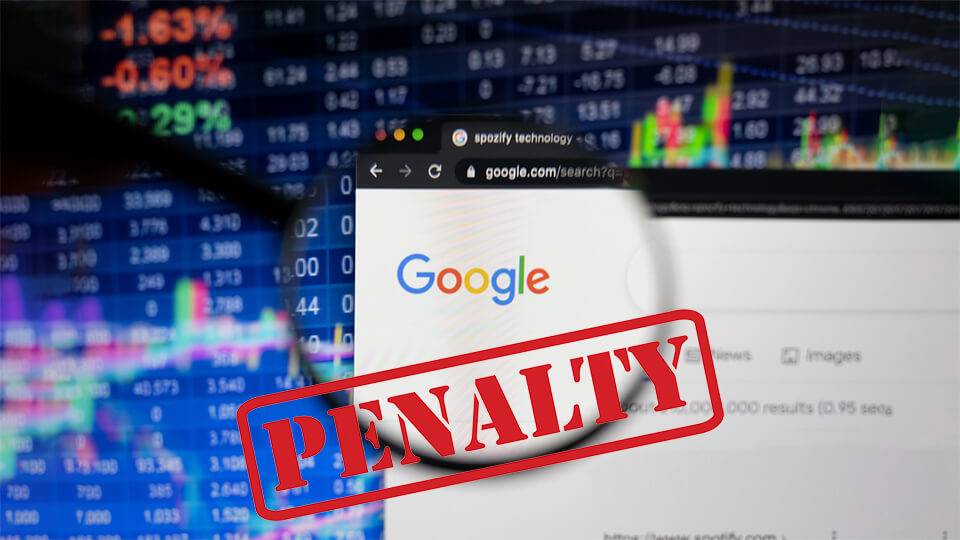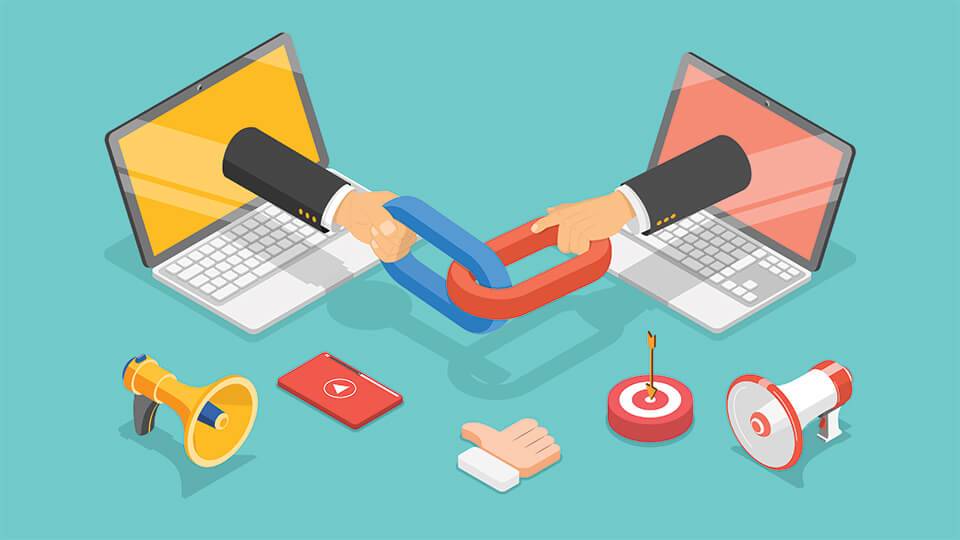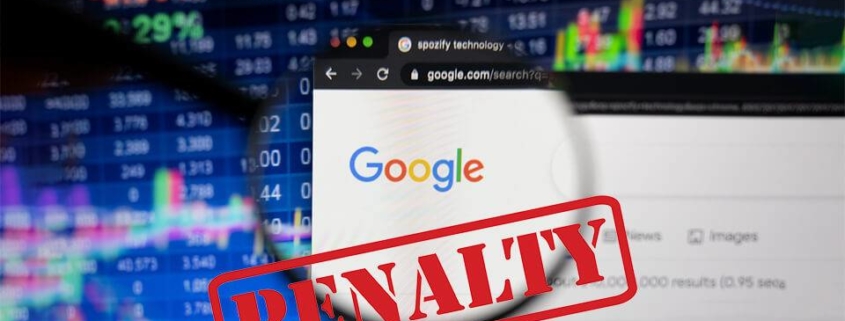Google Penalties Explained with Ten Examples

Has organic traffic to your website disappeared overnight? Do your web pages no longer appear in a prominent position on Google? In that case, there is a good chance that you have incurred a Google penalty.
What Is a Google Penalty?
The Google ranking algorithm is like a point system. You get plus points for page load speed, mobile friendliness, genuine backlinks, and traffic. But you can also incur penalties if you break Google’s rules.
A minor infringement might cause a site to drop a few places in the Google SERPs (search engine results pages). More serious breaches of the rules could see the site relegated to the SERP pages that no one ever visits. In the most severe cases, Google will delist a site.
Types of Google Penalties
There are two types of Google penalties. The first is an algorithmic penalty, which may occur when google updates its algorithm. Algorithm updates essentially mean that Google has changed the points system for ranking. If your site loses traffic after an algorithm update, your site has fallen foul of the new system or rules.
The second type of penalty is a manual action, which has been imposed by a Google employee who has visited your site. Such visits may occur randomly or result from a complaint made to Google about your site.
Why Does Google Penalize Sites?
It can feel like Google is the enemy of website owners sometimes. But Google is only attempting to ensure that the best and the most relevant websites appear at the top of the list. So, it penalizes sites that appear to be manipulating their ranking by employing black hat SEO (search engine optimization) techniques. Or, to put it another way, Google penalizes sites that cheat! The term black hat refers to western movies in which the bad guy usually wore a black hat, and the good guy, who abided by the rules, wore a white hat.
What Can You Do If Your Site Is Penalized?
Unfortunately, recovering the rankings of a website that has been penalized can be challenging, if not impossible. You may not even be able to uncover the reason for the penalty.
In the case of a manual action, you will find the cause of the penalty in the Google Search Console. You can then try fixing the issue and resubmit your site for indexing.
Algorithmic penalties are trickier to identify. Google issues notifications of updates but often does not provide specific details. Consequently, it can be challenging to determine what has caused a penalty. However, you will probably gain some insight by monitoring the online discussion about the last update.
Ten Things That Will Cause a Google Penalty

If you have been deliberately employing black hat SEO methods, you probably know what caused a penalty. However, it is possible to gain the disapproval of Google inadvertently. So, if you are scratching your head wondering what you have done wrong, here are ten things that may trigger a Google penalty.
- Keyword Stuffing
You need to optimize content for keywords so that Google can identify a page’s topic. However, if you use a keyword too often, you may get a penalty for keyword stuffing. Keyword stuffing means using the same word or phrase repeatedly to increase the relevance of the content to a particular search term.
It’s easy to over-optimize content from a keyword. After all, if you are writing about bananas, you will frequently use the word bananas. But if you use a word too often, Google may think it is a deliberate move designed to increase relevance. So, it is best to aim for a keyword density of around 1-2%.
- Thin Content and Gateway Pages
Google evaluates the quality of content and penalizes low-quality content. In particular, thin content and gateway pages will likely attract a penalty, which can be a problem for affiliate marketers trying to redirect visitors to another website. Google wants to direct its users to pages that offer value, not pages that are merely a doorway to another site.
You don’t have to be creating gateway pages to get caught out with a thin content penalty. If you have many pages containing few words, your site will rank lower than more comprehensive content. It would be better to consolidate the content into longer, more comprehensive articles.
- Cloaking
Cloaking is a black hat SEO technique that presents different data to search engines than what the human visitor sees on the page. There are various cloaking methods, the simplest of which is adding text to a page that Google bots can read but is invisible to the eye. For example, a long string of keywords in a font the same color as the background. Cloaking is a practice that can get a site permanently delisted.
- Unnatural Backlinks
Backlinks play a vital role in a website’s Google ranking because they indicate its popularity and quality. Consequently, there is a thriving market in the supply of paid-for links. However, buying backlinks is considered a ranking manipulation and could attract penalties.
White hat purists would say that you should never buy backlinks. However, many website owners do pay for links. The trick is finding backlink-building services that provide high-quality links that won’t attract the suspicion of Google. Still, even then, you are in breach of Google guidelines.

- Too Many Reciprocal Links
Exchanging links with other websites is a widespread practice and perfectly acceptable. For example, you might have reciprocal links with a handful of related sites. However, this link-building strategy is abused by some sites that actively trade backlinks, which is frowned upon by Google. Consequently, the excessive use of reciprocal links is likely to attract a Google penalty.
- User Generated Spam
Allowing user-generated content on a website, such as comments, guest posts, and forums will attract spam. Google penalizes sites containing too much spam. So, you must moderate user-generated content and remove spam as soon as it appears. You can simplify this task by installing anti-spam software.
- Viruses, Malware, and Hacked Sites
You will see your Google ranking drop if your website is hacked and infected with viruses and malware. Hackers may also publish content on your site or leave messages and banners on pages, which will have the same effect. If you don’t clean up the website swiftly, Google may delist it. Hence, security must be a priority for all website owners.
- Too many or Too Few Outbound Links
Google likes to see a reasonable number of outbound links because they add value to content. However, too many outbound links could indicate that you are selling or exchanging links, an activity that could attract a penalty. Outbound links to irrelevant or bad-neighborhood sites that have violated Google guidelines will also impact your site’s rating.
- Too Many Ads or Affiliate Links
As far as Google is concerned, a site should not exist solely to promote third-party products and services. Consequently, having too many advertisements or affiliate links on a site will negatively affect rankings. Too many promotions will also impact the user experience, leading to higher bounce rates. And high bounce rates will be another negative against your site.
- Low-quality Product Review Pages
Sometimes, Google changes its algorithm to favor specific types of websites or content. While not strictly a penalty, awarding extra points to particular site attributes can have the same effect. For example, Google recently rolled out algorithm updates that rewarded authentic, genuinely helpful product reviews. Consequently, low-quality, thin-content review sites containing little more than descriptions of products and affiliate links dropped many places on Google SERPs.
Conclusion
A Google penalty is not necessarily the end of a line for a website. You can fix issues and wait for the site to be re-indexed. You could submit a reconsideration request to Google if the site were delisted. In the meantime, you would be without organic traffic, which would be costly for a commercial website. So, it is best to stay on the right side of Google guidelines and resist the temptation to use black hat SEO techniques to increase your site’s ranking artificially.










